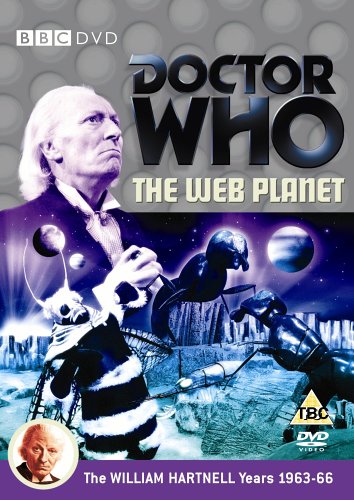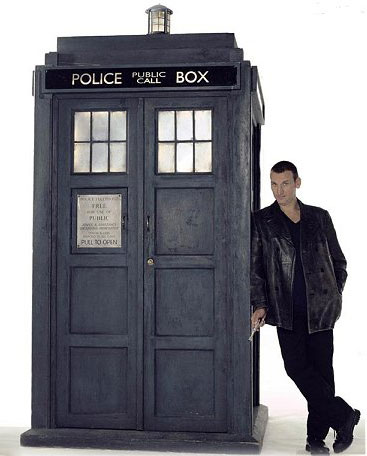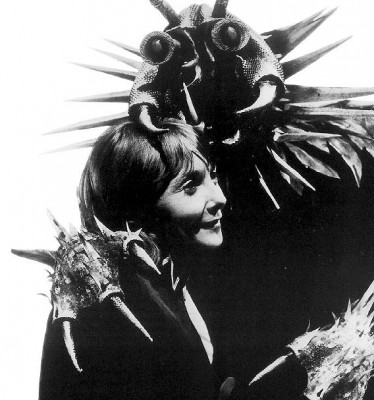 STORY 164: ALIENS OF LONDON (Aliens of London/World War III)This is the first two-parter of the revived Doctor Who, and while I might have stated this before I take this opportunity to say that when we have two-part stories I will adopt one title since it makes it easier for me.
STORY 164: ALIENS OF LONDON (Aliens of London/World War III)This is the first two-parter of the revived Doctor Who, and while I might have stated this before I take this opportunity to say that when we have two-part stories I will adopt one title since it makes it easier for me.The Doctor (Christopher Eccleston) and his Companion Rose Tyler (Billie Piper) have gone through time and space, but now they have returned to Rose's time, or at least they think it's her time. The Doctor's calculations were off... by only a year, a year where Rose's mom Jackie (Camile Coduri) searches for her and where Rose's boyfriend Mickey (Noel Clarke) is suspected of murdering one Rose Tyler. However, whatever private issues Rose faces are drowned out by a spaceship crashing into the River Thames at that moment, right down to clipping the Clock Tower of the Houses of Parliament.
In this emergency 10 Downing Street we have no news from the Prime Minister and the entrance of MP Joseph Green (David Verrey) and General Asquith (Rupert Vansittart). They are met by Ministry of Defence Junior Secretary Indra Ganesh (Navil Chowdhry), MI5 operative Margaret Blane (Annette Badland) and Transport Liason Oliver Charles (Eric Potts). With the exception of Ganesh and Harriet Jones, MP for Flydale North (Penelope Wilton) who was at Number 10 before the crisis began, all the others share a common trait: they all are rather fat. Coincidence? Not in Russell T. Davies' script. As
Aliens of London progressed into its second part, I believe NOTHING in his script was coincidental, but I'm getting ahead of myself.
The Doctor is eventually called in to help, as is UNIT (United Nations Intelligence Taskforce). However, our three fat friends have a trick up their sleeves...they are not human. They are the Slitheen, a family who have plans for Earth. At first you think the Slitheen are here for conquest, but we get another twist. After a Slitheen nearly kills Jackie, she and Mickey join forces on the outside while The Doctor, Rose, and MP Jones (whose name the Doctor recalls but doesn't know from where) are trapped inside Number 10. The Slitheen wish to unleash a nuclear war on the planet so as to destroy all humanity and create a barren world, one which the Slitheen can sell at a profit. Green, now the Acting Prime Minister, tells the population that the aliens are above them and have "massive weapons of destruction capable of being deployed within 45 seconds", and ask the United Nations to give them the nuclear codes. If the UN gives the authority to have a 'preemptive strike', the Slitheen will destroy the world. The Doctor has a way out of all this, but it means risking Rose's life, a situation Jackie cannot tolerate. Still, there is simply too much at stake. Rose and Jones push the Doctor to take the step to stop the Slitheen, and with the help of "Mickey the Idiot" (the Doctor's nickname for Mickey Smith), he launches a strike of his own.
Is it me, or was
Aliens of London a lot of things: a two-hour "Bush/Blair lied us into war" advert, a juvenile comedy, an anti-capitalist episode, but not a good two-parter
Doctor Who? It may just be coincidence, but this is the second episode (after
The End of the World) where the motive for all this murder was PROFIT. I'm beginning to suspect Davies is a bit to the left. The Slitheen aren't even a species, but a family, no different than say the Rockefellers, the Vandervilts or the Astors. This was a bit confusing in that when we learn what planet they are from, does that mean that instead of Slitheen they should be called "Raxacoricofallapatorians"? (Side note: Eccleston deserves a bonus just for being able to pronounce Raxacoricofallapatorius). The Slitheen, away from their human disguise, were a curious creature: both cuddly and monstrous. They were good monsters, but something was off, and I think I know what it was.
It was the farting. It isn't until Part Two (
World War III) where we got an explanation for the farting, but to my mind Davies wanted a funny episode, and that's what he got. I couldn't take it seriously because all that farting was done in Part One for humorous effect, or at least that's how it came out (pun intended). If that wasn't bad enough, the Pig Thing. When in Part One you see the alien is a PIG, you start to wonder if we're suppose to take ANY of it seriously. Yes, we got an explanation as to WHY it looked like a pig, but Davies and director Keith Boak can't possible throw a pig at us and not expect us to laugh. All I could hear in my mind was "
PIGS...IN... SPACE..." and wouldn't blame anyone else for doing the same. Going back to the farting, I put in my notes "wonder if the farting is to appeal to the children" who I figure would like that sort of bathroom humor. It wasn't to my liking because it did become a little distracting.
You also have things that I didn't follow. You introduce UNIT, which would be great for longtime fans but whom revived fans will know little to nothing about, then you kill them off before they do anything. I wonder why bother having them there in the first place...unless it's some sort of bait-and-switch. What also makes me think this was more a comedy than a straight science-fiction was "Harriet Jones, MP for Flydale North". Every time someone asked who she was, MP Jones would flash her ID and state everything but her serial number (having already given us her name and rank). Adding to my criticisms of
Aliens of London, I am surprised that being overweight was a major plot point. You'd think that Davies (who is by no means svelte) would not be so quick to take shots at fat people...right down to the farts.
One thing in the script did surprise me above all else. It was in Episode One where Rose tells the Doctor how silly he was being for being so sensitive about Jackie slapping him (the slap was in itself a fine moment). "You're so gay", she tells him, and while it makes sense for that common saying (in every sense of the word) to be said by someone of Rose's background, I wonder why an openly-gay man like Davies (who also created the original and still-controversial
Queer As Folk) would use that specific phrase. Will it lead kids to think it's acceptable to dismiss people by saying "you're so gay"? I found that quite troubling.
I don't deny the extraordinary talent of Davies--he's a brilliant writer who puts his ideas on paper and knows how to show them. Of course, his ideas appear to be about his subconscious desire to assassinate Tony Blair. Part of me kept thinking as that missile headed toward Number 10 that he was thinking as he typed, 'Here you go, Tony, for betraying all of us who voted Labour, for becoming that bastard Bush's poodle, for lying about weapons of mass destruction you both KNEW didn't exist, for illegally invading Iraq, which had peace and beauty and whose people were watched over by a benevolent leader until you lied to the UN and the world to get your hands on their oil. Take this, Ha Ha Ha". Of course, this could all be in my head (the unnamed Prime Minister was already dead when the crisis began), but it's the things about the weapons of destruction line that lead me to this conclusion:
Aliens of London expresses the producer/writer's view on the Iraq Intervention. It's even more curious in that when the spaceship clipped the Clock Tower, to this American, echoes of September 11th played in my mind. Perhaps then, this makes
Aliens of London the ultimate in 9/11 conspiracies: "they" created a crisis to bring about a war for profit.
As a writer, Davies brings a great deal of himself into his work. I digress to say that the episodes of
Queer as Folk that I've seen, I couldn't help but think the three characters were aspects of himself (real or imagined), right down to the
Doctor Who-loving Vince Tyler (how curious that Vince & Rose share the same last name. Curious, that). Therefore, I don't think it's beyond the realm of possibility that Davies' political views, specifically in regards with the Iraq Intervention, played a significant part in the overall story of
Aliens of London.
In fairness to Davies, I cannot read his mind or know his thoughts; however, I can only express mine. It would be foolish not to think that
Aliens of London is Davies' (and by extention, the Left's) response to how we ended up in Iraq, and contrary to what people might think, I think this is a brilliant example of what science-fiction can do: express current-day issues in the guise of a fantastical story. Therein lies Davies' high intelligence (even though as a viewer I've never been fond of stories being written to create a certain viewpoint, whether I agree with it or not). And thus ends my reading of politics into a two-part
Doctor Who.
If we focus on the acting, I think Wilton's Jones did a great job balancing comedy with fear. For the most part, she was comedic but in the Cabinet Room, you got that there could be steel beneath her natural insecurity. Coduri showed throughout the story a genuine love for her daughter--in her loss when Rose disappeared, when the Doctor tells her that Rose may die, right down when she waits those 'ten seconds'. In fact, near the end there is quite a sad and touching moment between Coduri and Piper when Rose opts to leave again. Eccleston kept his manic, almost giddy sense of his Doctor, but he still managed to be frightening in his seriousness when called for. His Doctor isn't all goofy grins but a growing sense that the fun he has in exploring comes with a cost.
I'm going to wrap up with this: at two episodes I think the story was too long. Part One:
Aliens of London was quick, sharp, funny (minus the pig and the farting). Part Two:
World War III just seemed to drag a bit, to the point that I wonder if we couldn't wrapped all this up in one episode. It's as if the second part couldn't hold my interest as the first one did, as if Part Two collapsed from all the energy of Part One.
If I were to score them separately,
Aliens of London would get 8/10 while
World War III would get a 4/10. However, I have to score them together because they are ONE story, so I might have to balance it out. In the final analysis, this story, ironically, carries little weight.
6/10Next Story: Dalek






.jpg)


